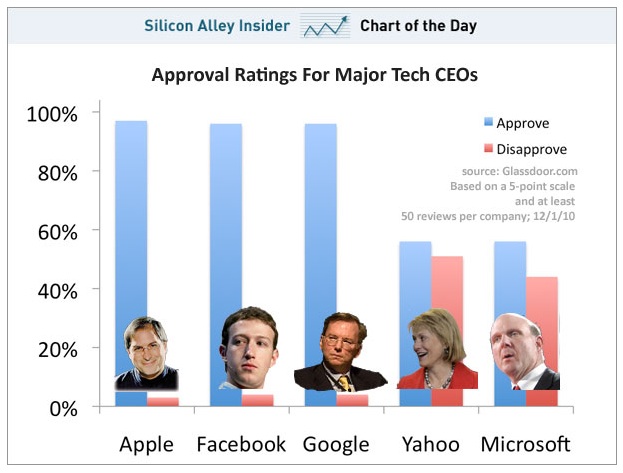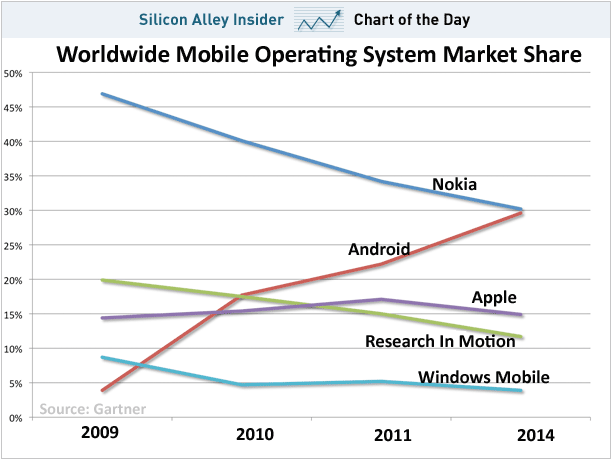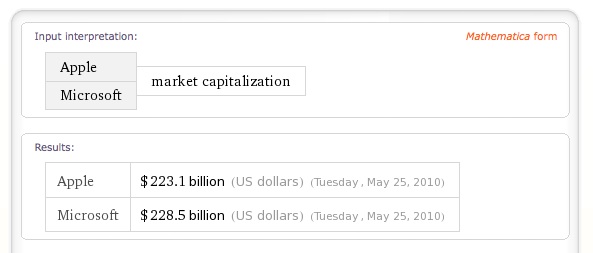Based on (small-scale) surveys of employees in the five companies. Hmmm… I wonder how stock options and share prices might affect sentiment.
Category Archives: Microsoft
Dinner with Mundie
One of the more enlightened things that Microsoft does to to maintain a really serious research effort, employing really first-rate people and giving them great freedom. This report of a dinner conversationw ith CEO Craig Mundie suggests that the policy will continue.
The centrally funded model for Microsoft Research is still right: This is especially interesting to me, because I have written two books on corporate research. I can tell you that funding a corporate research operation straight from central corporate coffers — as opposed to via contracts with various business divisions for work they want done — is almost unheard of in this day and age. That’s because most companies believe that in order for their research groups to have good ties to their business needs, labs need to get all, or at least a major part of, their funding from business divisions — for work the business divisions want done. Microsoft’s approach is to let MSR work without those strings, in order to keep researchers more unfettered and open to new things. "I still think that that was and remains a good strategy," Mundie told me. Over the years, many have questioned whether Microsoft’s investment in MSR has been worth it, and everyone from Gates to SVP of research Rick Rashid on down has steadfastly maintained it has been — with contributions to just about every Microsoft product. The way Mundie put it to me: MSR is “just becoming more and more integral.”
(Note: I am talking about research, the ‘R’ part of R&D. The vast majority of Microsoft’s roughly $9 billion annual investment in R&D is for development, with the research labs getting only a fraction of this amount.)
Ballmer unloads
From Good Morning Silicon Valley.
Microsoft CEO Steve Ballmer last week sold 49.3 million shares in the company worth $1.3 billion, according to an SEC filing. The shares Ballmer sold amount to 12 percent of his stake in the world’s largest software maker, and still leaves him with a 4.2 percent stake, according to Reuters.
The timing, coinciding with high-profile product releases of the Kinect and Windows Phone 7 — which are now on sale in the United States — might be curious. But in a statement on Microsoft’s website, Ballmer cites tax planning and financial diversification as reasons for his first stock sale in seven years, and says he plans to sell up to 75 million shares by the end of the year. “Even though this is a personal financial matter, I want to be clear about this to avoid any confusion. I am excited about our new products and the potential for our technology to change people’s lives, and I remain fully committed to Microsoft and its success,” Ballmer said.
Tech industry veteran Don Dodge estimates that the move will save the outspoken CEO $100 million in capital gains taxes before they rise next year.
As the man said, a billion here and a billion there and pretty soon you’re into some serious money.
Internet Explorer pulls Lazarus stunt
The Financial Times Techblog has a useful post pondering the significance of the Beta version of IE9. Its conclusion is that Microsoft has finally begun to innovate in the browser field again — which is good news for everyone (and will, in due course, lead to a re-evaluation of ‘the-Web-is-dead’ meme). Developments singled out by the FT include the new browser’s ability to tap into the graphics capabilities of contemporary PCs, smarter use of screen real-estate and the way it harnesses the capabilities of HTML5.
Now, all I need is a PC to try it on…
Why would a senior Microsoft exec want to head up Nokia?
Stephen Elop, a leading Microsoftie who was tipped to succeed Steve Ballmer, has left to become Nokia CEO. Maybe he knows something we don’t.
Chart from BusinessInsider. I found it on Jean-Louis Gassée’s startling picture of the mess that is Nokia today.
Android and upwards
From the latest Gartner report.
In the smartphone operating system (OS) market, Android expanded rapidly in the second quarter of 2010, overtaking Apple’s iPhone OS to become the third-most-popular OS in the world.
The rankings for the second quarter of 2010 are:
Symbian (41.2%)
RIM (18.2%)
Android (17.2%)
iOS (14.2%)
Windows Mobile (5.0%)
Linux (2.4%)
Others (1.8%)
This time last year, Symbian had 51% and Android 1.8% of the market. Apple had 13%.
Growing pains
This morning’s Observer column.
Over the past two months, Apple’s market capitalisation (ie its value as measured by the stock market) averaged out at $229.8bn.
The corresponding figure for Microsoft was $215.9bn. And yes, you read those numbers correctly: Apple is now worth significantly more than Microsoft, and the difference isn’t just a flash in the Wall Street pan.
This has implications for all of us who follow these things. The mainstream media, for example, need to discard the rose-tinted spectacles through which they have viewed Apple ever since Steve Jobs returned to the helm in 1997. Apple is no longer the Lucky Little Company That Could but a looming, secretive, manipulative corporate giant.
Recent developments suggest that Apple itself also needs to adjust to its new status as just another company…
Apropos the Microsoft comparison, Randall Stross has a useful piece in today’s NYT. Microsoft continues to be a formidable company, but from the viewpoint of investors it’s become more like GE or Big Oil (excepting BP, perhaps) — a good ‘banker’ stock for a part of one’s pension portfolio.
Jobs: Great unwashed don’t need PCs
Hmmm… This from TechEye.
It is official: Steve Jobs no longer thinks that PCs are going to be that important.
Speaking at the D8 conference, the Apple supremo said the day is coming when only one out of "every few people" will need a traditional computer.
For evidence he said that when the US was an agrarian nation, all cars were trucks because that's what you needed on the farms.
"Cars became more popular as cities rose, and things like power steering and automatic transmission became popular," he said.
He thinks that PCs are going to be like trucks. They are still going to be around… but only "one out of x people will need them."
Of course x is an unknown figure so Jobs is hedging his bets a bit. He could mean that only one in ten people will need one or one in two. It is a moot point if very many people need one now, but whether or not they own one is another matter.
Jobs claimed that advances in chips and software will allow tablet devices like the iPad to do tasks that today are really only suited for a traditional computer, things like video editing and graphic arts work.
He said that the move will make many PC veterans uneasy, "because the PC has taken us a long way."
"We like to talk about the post-PC era, but when it really starts to happen, it's uncomfortable," he said.
Needless to say, Ray Ozzie doesn’t agree.
Apple & Microsoft: the gap narrows
The parallels don’t stop here, either. It seems that the anti-trust guys in the Department of justice are beginning to take an interest in Mr Jobs’s plucky little company.




